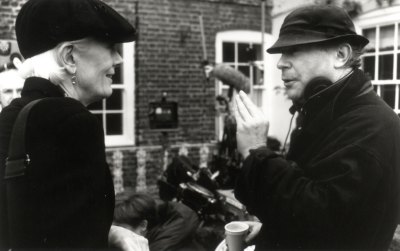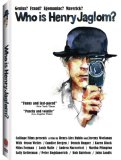| Reviews & Columns |
|
Reviews DVD TV on DVD Blu-ray 4K UHD International DVDs In Theaters Reviews by Studio Video Games Features Collector Series DVDs Easter Egg Database Interviews DVD Talk Radio Feature Articles Columns Anime Talk DVD Savant Horror DVDs The M.O.D. Squad Art House HD Talk Silent DVD
|
DVD Talk Forum |
|
|
| Resources |
|
DVD Price Search Customer Service #'s RCE Info Links |
|
Columns
|
|
|
Who Is Henry Jaglom?
For the uninitiated, Jaglom's approach to making movies has been likened to that of John Cassavetes, Robert Altman, Alan Rudolph, and few others. Though many wrongly assume Jaglom's movies are completely improvised, made up as they go along, he argues that what's misinterpreted as improvisation is really an alternate approach to the standard director-actor relationship. He's more interested in what his actors can draw out of themselves and bring to the film, and that he's flexible enough to work his loose-fitting plots around the one-of-a-kind raw material they provide him, rather than impose a restrictive directorial style.
Jaglom's best-known films tend to zero in on a specific topic - loneliness and being alone, women and eating, women and their maternal instincts, the end of a love relationship. Often Jaglom will bring together several dozen actor friends (and sometimes non-actors and other directors) who work through the issue at hand in a collaborative process that, typically, blurs the lines between the narrative fiction and documentary film.
This documentary is quick to acknowledge Jaglom's critics. Mike Snyder of Flipside magazine calls Jaglom's Venice/Venice nothing more than "an electronic presskit, a commercial for himself."
Others, including this writer, admire Jaglom's movies even when they don't quite work overall because inevitably there are always little epiphanial nuggets of characterization guaranteed to stay with you, while his best films (my favorite remains Someone to Love) are filled with the kind of personal intimacy one has with lovers and best friends late into night (usually after a few bottles of wine) but which one rarely sees laid raw on film. It's like comparing Sergei Bondarchuk's War and Peace with the kind of historical epics made today. All that CGI may provide limitless spectacle, but there's something to be said for the Real Thing, a hundred thousand real costumed extras, acting out 19th century battles on a 1:1 scale. Maybe it's precisely because we don't know exactly where the acting ends and the reality begins in Jaglom's movies that make them so mesmerizing.
Who Is Henry Jaglom? is an all-access show. Jaglom himself gave the project his blessing as it features scads of his personal home movies, clips from his movies and TV interviews, and interviews he okayed with a great many longtime collaborators and friends, including Candice Bergen, Dennis Hopper, Lee Grant (his Actors Studio teacher), Andrea Marcovicci, Karen Black, and critics like Andrew Sarris, Molly Haskell, and Bruce Williamson. It's almost like a Jaglom movie itself, an exploration of one man's obsession with capturing and analyzing raw emotions; clips show him filming himself by the age of 20 and everyone else within earshot of his boom mike or tape recorder forever thereafter. He's like a benign Peeping Tom; he doesn't stab women to death with a blade-enhanced tripod - he just bugs the shit out of them occasionally.
In Who Is Henry Jaglom?, some of these women argue that this freedom in front of the camera comes with a price, that Jaglom can be a short-fused martinet on the set at times hypocritical of the very methods he professes, and behind-the-scenes footage (mostly from Last Summer in the Hamptons) would to some degree seem to bear this out. However, others like Candice Bergen (who calls Jaglom a "kamikaze intellectual") swear it was through his friendship and generosity of self that they were able to find empowering qualities they never knew they had in them. As Bergen puts it, if Jaglom had been her husband or father, "I could've taken Poland."
Beyond clearly explaining the charms and (for some) the irritating aspects of Jaglom's movies, Who Is Henry Jaglom? is, like the director's own films, as funny as it is fascinating, from a revealing interview with Jaglom's priceless, screen gem of a brother, Michael Emil (Insignificance) to some hilarious clips from Henry's early acting career, on TV's Gidget and, best of all, suffering a bad LSD trip in Psych-Out. Another highlight finds Jaglom a guest on Bob Costas' excellent late-night show, during which Jaglom decides to turn the tables on the hopelessly bemused host, only to have Jaglom then decide Costas' personality is too banal to be bothered with!
Video & Audio
First Run Features has a long history of problematic transfers, and Who Is Henry Jaglom? is, sorry to say, no exception. The problem here has turned up on other titles of theirs; I've noted the same issue on Breasts: A Documentary, for instance. The film clips and archival video interviews all look fine, but for some reason new interviews shot specifically for the documentary look flat-out awful, with harsh horizontal lines breaking up the image to the point where the image actually becomes hard on the eyes. I've seen both this and Breasts on cable prior to viewing the DVD and it's definitely a transfer issue. Otherwise, the full frame image is okay. The stereo audio is good; there are no subtitle options.
Extra Features
Who Isn't Henry Jaglom? is a 33-minute interview with Jaglom looking back at the film and his mixed reaction to it; he initially calls it grotesque but then admits he finds it entertaining and that he's "probably the largest single consumer of the film." His main complaint, not unreasonable, is that it should have been more about his unique process of making movies and less about his personality quirks.
As always, Jaglom is a good interview subject but whoever put this featurette together had the none-too-bright idea to imitate Jaglom's style, and the results are quite embarrassing. The interview is presented entirely uncut, as if to suggest Jaglom's fussiness about where to sit, concerns about a phone ringing in the background, and his mild irritation at the inanity of some of the questions were highly eccentric reactions, when in fact they're perfectly reasonable for someone with, obviously, a lot more experience as an interviewee than the crew and interviewer are in their roles.
Interviewer Jeff Goldsmith (Creative Screenwriting Magazine) obviously didn't do enough preparation prior to the interview, he's too easily intimidated by Jaglom and tries too hard to be hip to Jaglom's unpredictable nature, rather than go with the flow. The lack of editing only serves to makes him look inept while Jaglom comes off rather well, considering. A video trailer is also included.
Parting Thoughts
As the director himself says, Who Is Henry Jaglom? works best as an introduction to a type of filmmaking that in this MTV/video game-driven cinema age we find ourselves in, must seem pretty alien to anyone under the age of 40. It's a film that makes you want to rush out and see the end result of this radical approach to making movies that, in 17 or so movies thus far, has reaped some huge rewards.
Film historian Stuart Galbraith IV's latest books, Japanese Cinema and The Toho Studios Story, are now available for pre-order.
|
| Popular Reviews |
| Sponsored Links |
|
|
| Sponsored Links |
|
|
| Release List | Reviews | Shop | Newsletter | Forum | DVD Giveaways | Blu-Ray | Advertise |
|
Copyright 2024 DVDTalk.com All Rights Reserved. Legal Info, Privacy Policy, Terms of Use,
Manage Preferences,
Your Privacy Choices | |||||||















